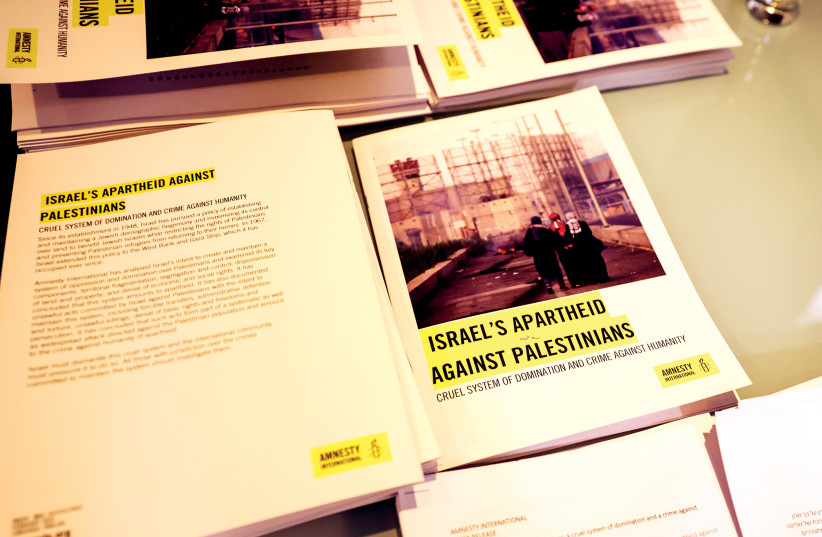For many years I have felt comfortable teaching my students how to advocate for Israel in the face of claims that it is an apartheid state.
While it is true that there is racism here, and discrimination, and not every citizen is treated equally in practice, as a former South African who grew up under apartheid, I have felt safe in arguing that the Jewish state is significantly different from what that country was.
Today, with an incoming government comprising racists, convicted criminals and Jewish supremacists, I am filled with fear. In this opinion piece, I will present my traditional argument that Israel is not an apartheid state, and then my fear of what might change.
Apartheid in South Africa
When I was growing up in South Africa, we sat down to dinner at exactly 7 p.m. Agnes, one of our three full-time servants, swung through dividing doors from the kitchen just as the radio news, brought to us by Peter Stuyvesant cigarettes, was chiming. She plonked platters of steak and chops and chips and peas and salads and chutney on the table as the anchor announced that President P.W. Botha had visited another Bantustan, or the British Lions were boycotting the Springbok rugby team. Agnes, like co-maid Jane, wore a brightly floral, button-down sort of tunic, with matching apron and cap. At age five or six, my brothers and I questioned none of it.
As we grew older, the talk around the table changed. We wondered why our maids couldn’t go to the beach – unless they were looking after us – and why they had separate ambulances, hospitals, and swimming pools. Although they didn’t have swimming pools at all, and hardly any hospitals. I didn’t know if they had cinemas or restaurants or hotels, but they certainly couldn’t enter ours, unless they were cleaning them. Blacks could only sit upstairs on buses. Most whites had cars, so black workers stood in the sun or rain as buses passed their stop, crowded beyond capacity upstairs, and almost empty below. There were two entrances to post offices and two doors to banks – one for “Europeans” (though most whites had never set foot in Europe), the other “Non-Europeans” (Blacks, Coloureds, Indians and Asians).
If a black person was born in Belgium, say, and for some reason had to visit Johannesburg, he would discover, to his horror, that he was “Non-European.” Americans, Australians, Canadians, New Zealanders – anyone with white skin – was “European,” too. At least in South Africa.
My parents, who were born there, were Europeans. Their parents had fled their native Europe when it became a dangerous place; Cossacks were killing Jews across the country. My grandparents waded across wide Lithuanian rivers and stowed away on ships, traveling for weeks to escape the pogroms of Europe so that their children could be born in Africa and be free. But we were all European in Africa, and it was lucky that we were. In Africa, Africans weren’t free.
It was illegal to have a drink with a black person. It was illegal to go to a movie with a black person. It was illegal to play on the same sports team as a black person. It was illegal to hold hands with a black person (unless you were four, and the hand was attached to your nanny.) Blacks didn’t vote, and blacks were not in the government, and sometimes blacks who criticized the country woke up dead.
Apartheid (or “apartness” in Afrikaans) was a system of legislation that upheld segregation against non-white citizens of South Africa. The UN General Assembly adopted the International Convention on the Suppression and Punishment of the Crime of Apartheid (ICSPCA) in 1973, defining apartheid as “inhuman acts committed for the purpose of establishing and maintaining domination by one racial group... over another racial group... and systematically oppressing them.”
The crime of apartheid was further defined in 2002 by Article 7 of the Rome Statute of the International Criminal Court as encompassing inhumane acts such as torture, murder, forcible transfer, imprisonment, or persecution of an identifiable group on political, racial, national, ethnic, cultural, religious, or other grounds, “committed in the context of an institutionalized regime of systematic oppression and domination by one racial group over any racial group or groups and committed with the intention of maintaining that regime.”
Israel is not an apartheid state
South Africa was an apartheid state. Israel, despite Amnesty International’s recent report, is not. Amnesty’s declaration that Israel is an apartheid state does not differentiate between the West Bank and Israel “proper”; the whole country – inside the Green Line, outside, everywhere – practices apartheid, according to them. Hebrew University Prof. Francis Raday, a UN International Human Rights expert, has argued up to now that this comparison was ill-founded. “Amnesty claims that the racist domination inherent to apartheid was written into the DNA of Israel from its inception, with Jewish immigrants coming to settle and expel the indigenous Palestinians, and that it continues to be so in the current treatment of the Palestinian minority,” she explains. But, according to her, this ignored salient facts: the Jews were also indigenous; many came as refugees and not colonialists; the confrontation is not between colonizers and colonized but between two peoples tragically deprived by history of a homeland.
In the last government, Israeli Arabs, who are 21% of the population, held 17 out of the 120 Knesset seats; one Arab party (Ra’am) was even a member of the governing coalition. Until now, claims Raday, with all its faults, Amnesty’s labeling of this reality as apartheid, as regards Israel proper, was “hallucinatory.”
There are no “Jewish-only benches" in Israel, and no Jewish-only bathrooms or hospitals, and no beaches that bar Arab swimmers. Everyone has free compulsory education, and medical aid; everyone can play on the national sports teams. Everyone can vote. Arab Members of Knesset can state, from the Knesset, that Israel is a terrible place; they do not end up dead the next day or find themselves falling from a window.
Is Israel a perfect paradise? Of course, it isn’t. Israel has its fair share of racists, and more than its share of incendiary, repugnant public figures who stir up hatred of the Other (not only of Arabs; plenty of stalwarts, including a leading figure, rant that anyone left of Likud is a traitor). The infamous Nation-State Law, passed by Netanyahu’s government in 2018, is a stain on our nation, proclaiming that in the Jewish state everyone is equal but some are more equal than others. There is an ocean of room for improvement on many fronts; our healing government of change didn’t have enough time. A full term just might have seen Naftali Bennett, Mansour Abbas, Yair Lapid and other sane ministers creating a brave new world here. Instead, we have just voted in Israel’s most extreme right-wing, religious government ever – and God knows what they might do.
Will Israel's new right-wing religious government make Israel an apartheid state?
Itamar Ben-Gvir, slated to be a minister, was convicted in 2007 of inciting racism and supporting a terrorist organization; his supporters chant “Death to the Arabs.” Bezalel Smotrich, another incipient minister, went on record stating that his Jewish wife shouldn’t have to give birth next to an Arab woman.
The rejection of a two-state solution, the incitement against the inclusion of an Arab party in the coalition, the legitimization of actions of illegal settlers and the racist rhetoric of the political block which is now in power are “tragically giving traction to the claim that Israel will meet the definition of an apartheid state,” says Raday, who finds the “march of folly into an apartheid state” by Benjamin Netanyahu and his far-right, anti-Arab coalition terrifying.
Even before the new government was sworn in, the West Bank was a contentious mess. Many Israelis, myself included, shudder in shame at what goes on there among certain communities. Occupation is never pretty; uprooting olive trees is un-Jewish and sick; no vote for entire populations was Hendrik Verwoerd’s apartheid dream.
But, says Raday, even here, while the whole settlement project was illegal under international law and while there are valid claims that settler colonialism is a war crime and involves severe humanitarian and human rights violations, the regime will only be properly classified as apartheid when the intention of Israel materializes to maintaining permanent control over the Palestinian population in the territories.
Raday claims that this condition is not met so long as Israel has a bona fide intention to negotiate a two-state solution as has been, albeit tenuously, the position until now as recently articulated in the speech of outgoing Prime Minister Yair Lapid to the UN.
However, the agenda of the incoming government does appear to satisfy that condition, as it expresses fierce opposition to negotiating any peace settlement that will entail the withdrawal of Israel from the West Bank.
Until now, it has felt unfair to me that for many celebs, students, politicians and the general public in the world today, the knee-jerk reaction of labeling Israel an apartheid state was de rigueur. The gorgeous Susan Sarandon, for example, forever glowing in that driver’s seat as Thelma and Louise sail over the cliff, regularly denigrates the Jewish state as an apartheid entity without any contextual accuracy or awareness that half of all Israelis also ache for an end to an occupation which is tainting our souls and wreaking havoc on our soldiers.
But we need a partner for peace; we need a mutual plan. It’s not entirely honest to just hurl abuse at us. Sarandon’s tweet this year about Israeli soldiers deliberately executing Palestinian journalist Shireen Abu Akleh with a shot to the head as punishment for “telling inconvenient truths” is factually outrageous; it shouldn’t go uncontested.
Up until the demise of our brave government of change, I had dreamed of contacting influencers such as Sarandon who proclaim to millions of followers that “We’ve seen this before. This is what apartheid looks like.” Somehow maybe an offer of cappuccino and a chat about the nuances that go into this many-layered, complex country in the heart of the Middle East could infinitesimally change a few hearts and minds. We could agree that there is a huge amount to improve here; that Israel is probably not God’s answer to the world’s problems; but apartheid is an inappropriate epithet and not helpful to anyone.
But now, in another level of complexity, our fledgling government for change has fallen. Netanyahu and his bullies are poised to take over, and woe is us. Advocating for Israel now won’t be a piece of cake; even scones and cream might not do the trick.
Prof. Lynn Schler, head of the Tamar Golan Africa Center at Ben-Gurion University, says the whole discussion is simply a waste of time. “The word ‘apartheid’ is rooted in a very specific time and situation in South Africa,” she says. Our society, she claims, is grossly unequal whether it is technically apartheid or not. What we should be focusing on is how to get out of this, like South Africa did; how to bravely envision an end to the conflict and transition to a society of equality. “If we end the occupation, that’ll put an end to Apartheid Week on campuses worldwide,” she argues, “and we can concentrate on becoming a real light unto the nations.”
As yet another Netanyahu-led government is poised to take over the running of the Jewish state, almost half the country is shaking while waiting to see what the next few years will bring. The religious members of the new government must surely be aware of Hillel’s famous dictum that the Torah can be summed up while standing on one foot: “Do not do unto others as you would not be done by.” No one would like to live under apartheid. ■

